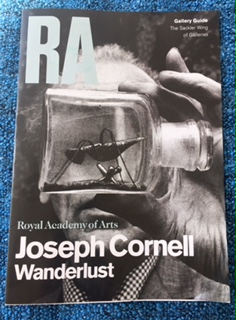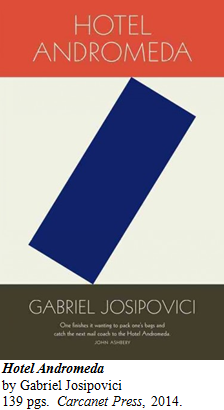'Hotel Andromeda' by Gabriel Jocipovici is Inspired By Life Of American artist Joseph Cornell9/8/2015 by Rana Asfour The exhibition: Currently on exhibit on the top floor of the Royal Academy of Arts in London, is a unique collection of art objects by American artist Joseph Cornell. You will have to take the stairs to get to it as the lift is not working, but trust me, it is worth it. Besides, once you're up there, you can rest on a stone bench in a small enclosure found at the back of the stairs that faces a marvellous sculpture by Michelangelo; actually the only marble sculpture by Michelangelo in a British collection. The exhibit, 'Wanderlust', has been heralded 'first rate' by the Guardian, and 'spellbinding' by The Telegraph, and showcases the best of Purcell's artwork, mainly his 'shadow boxes': modest, glass-fronted constructions which transport the viewer into imagined realms. The exhibition is on until September 27. A mere few days later, I would come across another of Purcell's work as I went about the galleries at the Museum of Modern Art in New York City. What fascinates most about this artist is that he never once travelled anywhere beyond his city (New York) and yet his work is all about different places from around the world; places he yearned to visit. Dubbed an 'armchair vogager', Cornell is known as one of the 20th century's most innovative, original and inventive artists. To know more about him, click HERE. Now why would I be telling you about the exhibition? For two reasons really. The first is that it really is quite an entertaining exhibit which at times I found oddly uncomfortable, and second because I want to tell you about a recent novel called 'Hotel Andromeda' by Gabriel Jocipovici. According to Timothy Hyman, a British figurative painter, art writer and curator from the Royal Academy, 'Gabriel Josipovici’s most recent novel, 'Hotel Andromeda', offers a wonderful entry-point into the collage-boxes of Joseph Cornell. Evoking the specific ‘atmosphere’ of this most reclusive and elusive of twentieth-century culture-heroes, he sidesteps any critical closure, in an exploration always open to ethical and aesthetic uncertainty. A young woman, an art-historian in contemporary London, struggles to maintain her belief in art’s value, in the face of catastrophe elsewhere; out of this tension, Josipovici creates a marvellous tragi-comic ‘box’, within which Cornell’s own poetic vision emerges – both light and profound'. The book:
In a house in a quiet street in North London, Helena struggles with her self-appointed task of writing a book about the reclusive American artist Joseph Cornell. At the same time she dreams and thinks about her sister Alice working in an orphanage in Chechnya. She is certain that Alice despises her for living a life of comfort and privilege, far away from the horrors of war; yet she knows too that her work is more than self-indulgence. How to reconcile these two visions? Enter Ed, a Czech journalist and photographer who claims he has been working in Chechnya and brings news of Alice, along with the request for a bed for the few days he has to be in London. Gabriel Josipovici's sparkling new novel charts the course of those few days, as Joseph Cornell's mysterious life and the strange boxes he constructed wage a silent struggle in Helena's mind and spirit with the imperatives of the present.
0 Comments
Your comment will be posted after it is approved.
Leave a Reply. |
Archives
March 2021
|






 RSS Feed
RSS Feed
